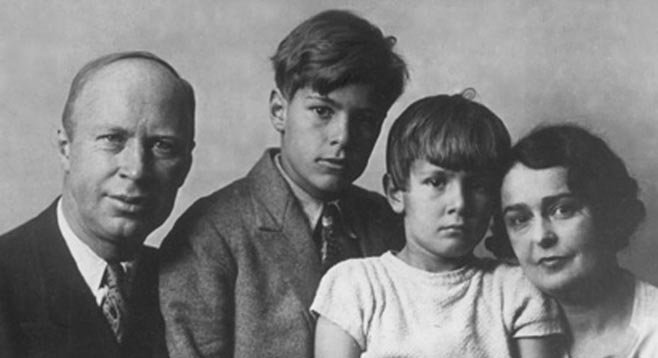Serge Prokofiev Foundation Archive

The Serge Prokofiev Archive that has been housed for many decades at Goldsmiths College, University of London, has arrived in RBML and is now available for use by Prokofiev researchers. Constituted in successive stages over a period of 60 years, this impressive collection was gathered by Prokofiev himself and by members of his family, but credit for painstakingly gathering everything together must go to Noëlle Mann. Her dedication to the preservation of Prokofiev’s legacy remains unparalleled.
During his prolonged stay in the West from 1918 to 1936, Prokofiev accumulated a large personal archive. When he returned to Moscow, he took only those papers and manuscripts that he judged necessary for life in the Soviet Union. Everything else was left in the care of close Parisian friends and his publisher, Edition Russe de Musique. These papers remained in France until 1974 when Lina Prokofiev, having returned to Paris after 38 difficult years, including imprisonment, in the U.S.S.R., was able to reclaim them.
In the years that followed, Lina devoted herself to promoting Prokofiev and to tracking down his personal effects and papers, thus increasing her husband’s collection. She created The Serge Prokofiev Foundation in 1983. After her death in 1989 at age 91, the work continued, with tremendous energy, when Noëlle Mann established the Prokofiev Archive in 1994 in London. What has come with the material from Goldsmiths College are high quality photocopies of the manuscript scores, correspondence, and business records held by the Foundation, the papers of Lina Prokofiev, including gathered materials for a planned biography of her husband, and those of Oleg Prokofiev, relating to his own work and to his father´s music.
Also in the archive is the largest collection of published material on Prokofiev in the West, including some 500 scores, over 400 books, periodicals and articles on Prokofiev, and nearly 500 concert programs. The fast-growing audiovisual collection contains almost 800 audio recordings on CD, LP and cassette, and 65 video/DVD recordings.
The collection includes Prokofiev’s private and business papers from 1919 through May 1936, after which he returned to the Soviet Union with his family. Correspondents include conductors such as Albert Coates, Sir Henry Wood, Sergei Koussevitzky, Hermann Scherchen, and Ernest Ansermet; soloists Joseph Szigeti, Pablo Casals, Robert Soetens, and Fedor Chaliapin; composers Igor Stravinsky, Nikolai Miaskovsky, and Maurice Ravel; directors Vsevolod Meyerhold and Alexander Tairov; Ballets Russes impresario Serge Diaghilev; and chess grandmaster José Capablanca. Business papers include financial materials such as bills and accounts, legal papers, and correspondence concerning concerts in the United States, France, Italy, Spain, England, the Soviet Union, and Germany, as well as materials relating to the publication and copyright of Prokofiev’s work.
Music manuscripts in the collection include sketches, drafts and full manuscripts for over 50 works principally composed during the years that Prokofiev spent in the United States, Germany and Paris. They include the orchestral Scythian Suite, his operas The Gambler, Love for Three Oranges, and The Fiery Angel, the Concerto for Piano Nos. 2, 3, 4 and 5, the ballet Le Pas d’Acier, and Symphony Nos. 1, 3 and 4.
“Prokofiev’s American debut was in New York, and his opera The Love of Three Oranges had its third performance here,” said Simon Morison, president of the Prokofiev Foundation. “The city vexed him, but he loved it and doubtless grieved -- in his final, Soviet years -- being unable to return. His wife Lina grew up in Brooklyn and Manhattan, and her uncle Charles Verlé taught at Columbia. So it is poignantly appropriate that such a large part of Prokofiev’s archive has found a new home in the RBML.”
The collection provides primary resource material for a major twentieth-century composer, and once the originals are added to the Archive already received, will provide access to manuscripts previously only available in photocopy form. It also provides a principal resource outside of Russia for the study of Prokofiev, and his family, friends, correspondents, and concert life in the early 20th-century.
For more information about access and holdings, please contact:
Courtney Chartier, Director, Rare Book and Manuscript Library
In the News
- Columbia to House a Trove of Prokofiev’s Items, The New York Times, October 2013